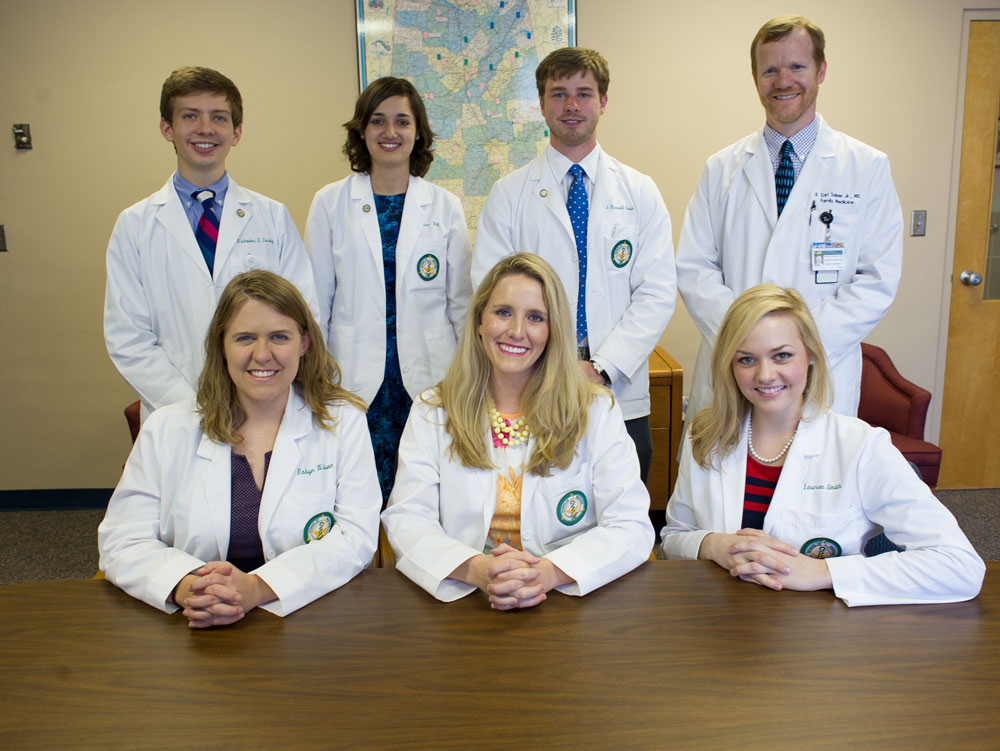 “In primary care, you get to take care of the whole patient, you get to care for their families,” said scholar Robyn Wilson from Clay, Ala. “A lot of (chronic) illnesses wouldn't progress to needing a specialist if you can make an impact at the primary care level.”
“In primary care, you get to take care of the whole patient, you get to care for their families,” said scholar Robyn Wilson from Clay, Ala. “A lot of (chronic) illnesses wouldn't progress to needing a specialist if you can make an impact at the primary care level.”The Association of American of Medical Colleges projects the United States will face a shortage of 45,000 primary care physicians by 2020. But Wilson, Amber Beg from Tuscaloosa, Nick Darby from Florence, Russ Guin from Brownville, Lauren Smith from Huntsville and Jessica Willis from Selma are bucking a trend of growing interest in specialties such as emergency medicine, dermatology and anesthesiology, which offer higher salaries or more stable work hours, or both.
“Primary care is about building relationships with patients,” Darby says. “I really want to go back to my hometown, and primary care is definitely an avenue to do that. I may want to work in one of the smaller communities outside of Florence. I have a lot of common interests with the people there.”
“Patients are developing an aversion to all the tests and scans (in modern medicine). That's intimidating to a lot of patients,” Smith says. “The route to a diagnosis might be different for a primary care physician who knows the family – having followed them thought their lives, knowing what they're doing in the community – and who is able to build trust with patient.”
The Primary Care Scholars Program is part of a larger primary care strategy designed by William Curry, M.D., a former community physician who now is professor of General Internal Medicine and associate dean for Primary Care and Rural Health in the School of Medicine and senior vice president for Population Health in the UAB Health System. Primary care is one of the strategic objectives of AMC 21, UAB Medicine’s quest of becoming the preferred academic medical center of the 21st Century.
“At UAB our goal is to provide outstanding education, training and research in primary care, in addition to our world-class work in the basic sciences and medical specialties,” says Anupam Agarwal, M.D., interim senior vice president of Medicine and dean of the School of Medicine. “This program helps us accomplish our goals, and these students are demonstrating the important role UAB plays in providing health care to the people of Alabama.”
With more than 30 qualified applicants for the six spots, B. Earl Salser Jr., M.D., an associate professor in the Department of Family and Community Medicine and director of the Primary Care Scholars Program, called the selected students “the top of the top.” In addition to their academic success, the students had to convey a true interest in primary care.
The highly selective process chose two first-year students based on merit for each of the three established campuses – Birmingham, Huntsville and Tuscaloosa. Two additional students will be chosen for the Montgomery campus after that campus begins enrolling students in 2014. The merit-based program will provide an annual scholarship of $10,000, mentoring, career modeling and academic opportunities such as summer workshops and a summer immersion program where the students will be working in a clinical setting.
“The program was created to foster and encourage the students to maintain interest in primary care—family medicine, internal medicine, pediatrics and a combination of adult and pediatric medicine — throughout their four years in medical school,”. Based on data, Salser says, “If there’s no exposure to primary care until the third or fourth year, the students begin to focus on other specialties and lose their initial interest in primary care fields.”
Medicine, says Beg, “is more than testing for diseases and treating symptoms. Illness doesn’t happen on a vacuum. If you're well integrated in a community you can work with community leaders to provide better care for your patients. Primary care physicians are well positioned to do this.”
Willis said, “I want to have patients I can treat throughout their whole lives. I want to take care of the person, not just the illness. And I want to live in a rural area.”
A rural setting was also important to Guin, who selected primary care, at least in part, after shadowing a physician in Tuscaloosa. “I like being able to work with patients long-term versus a one-time interaction.”
“We hope these scholars who’ve been selected for the program will not only go on to be great primary care physicians, but we also hope they will l be leaders in in the primary care field,” Salser said.
